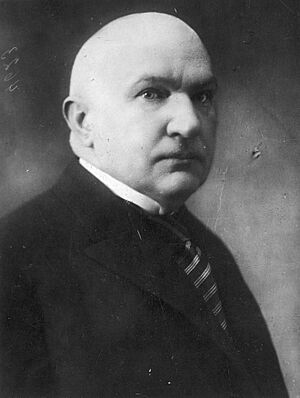Friedrich Akel facts for kids
Quick facts for kids
Friedrich Akel
|
|
|---|---|

Friedrich Akel in 1924
|
|
| 5th State Elder of Estonia | |
| In office 26 March 1924 – 16 December 1924 |
|
| Preceded by | Konstantin Päts |
| Succeeded by | Jüri Jaakson |
| Minister of Foreign Affairs of Estonia | |
| In office 2 June 1936 – 9 May 1938 |
|
| Preceded by | Julius Seljamaa |
| Succeeded by | Karl Selter |
| In office 23 July 1926 – 11 November 1927 |
|
| Preceded by | Ants Piip |
| Succeeded by | Aleksander Hellat |
| In office 2 August 1923 – 26 March 1924 |
|
| Preceded by | Aleksander Hellat |
| Succeeded by | Otto Strandman |
| Personal details | |
| Born |
Friedrich Karl Akel
5 September 1871 Kaubi parish, Kreis Pernau, Governorate of Estonia, Russian Empire |
| Died | 3 July 1941 (aged 69) Tallinn, Estonia |
| Cause of death | Execution by shooting |
| Political party | Christian People's Party |
Friedrich Karl Akel (born September 5, 1871, in Kaubi village, now Pornuse, and died July 3, 1941, in Tallinn) was an important Estonian diplomat and politician. He served as the State Elder of Estonia in 1924, which was like being the country's leader.
Contents
Early Life and Medical Career
Friedrich Akel was born in Kaubi village, which is now part of Mulgi Parish. He went to school at the Alexander Gymnasium in Tartu. Later, he studied medicine at the University of Tartu from 1892 to 1897.
After finishing his studies, he worked as a doctor. He was an assistant at the Tartu University Clinic. In 1898, he became an eye doctor at a clinic in Riga. The next year, he worked at a military hospital in Warsaw. In 1901, he traveled to Berlin, Prague, and Leipzig to learn even more about medicine.
From 1902 to 1912, Akel had his own eye doctor practice in Tallinn. During this time, he also served as an army doctor in the Russo-Japanese war from 1904 to 1905. He helped start the Private Clinic of Estonian Physicians in 1907. In 1912, he opened his own eye clinic.
Akel was also active in his community. He was a member and chairman of the Tallinn Municipal Council. He also served as an honorary justice of the peace. He was involved with many groups, including the sports society "Kalev" and the "Estonia" theatre building society. He also helped lead the Tallinn Loan and Savings Society. From 1920 to 1922, he was the vice president of the consistory for the Estonian Evangelical Lutheran Church.
Political Journey
Friedrich Akel became Estonia's State Elder in 1924. He held this important position from March to December of that year. During his time as leader, there was a difficult event. On December 1, 1924, the Communist Party of Estonia tried to take over the government. This attempt failed, and Akel was safe. However, the Minister of Transport, Karl Kark, sadly passed away during this event.
Akel also served as the Minister of Foreign Affairs several times. He held this role from 1923 to 1924, then again from 1926 to 1927, and finally from 1936 to 1938. This job meant he represented Estonia to other countries.
He was also an envoy for Estonia in different countries. From 1928 to 1934, he was Estonia's representative in Sweden and Denmark. Later, from 1934 to 1936, he served in Germany and the Netherlands. From 1927 to 1932, Akel was Estonia's representative to the International Olympic Committee.
From 1926 to 1929, Akel was a member of the III Riigikogu, which is like Estonia's parliament. He represented the Christian People's Party. Later, he was a member of the Estonian National Assembly in 1937. He also served in the Riiginõukogu, the upper part of parliament, from 1938 to 1940.
Final Years
In June 1940, the Soviet Union took control of Estonia. In October 1940, Friedrich Akel was arrested by Soviet authorities. He passed away in Tallinn on July 3, 1941. His wife, Adele Karoline Tenz, was also sent away from Estonia in June 1941 and died in the USSR in 1944.
Awards and Recognitions
Friedrich Akel received many awards for his service to Estonia and other countries.
Estonian Awards
- Order of the Estonian Red Cross, 2nd class (1927)
- Order of the Cross of the Eagle, 1st class (1935)
- Order of the Estonian Red Cross, 1st class (1936)
- Order of the White Star, 1st class (1938)
International Awards
- Order of the Three Stars from Latvia (1925)
- Commander Grand Cross of the Order of the Polar Star from Sweden (1934)
- Order of the White Eagle from Poland
 | Sharif Bey |
 | Hale Woodruff |
 | Richmond Barthé |
 | Purvis Young |

